CRJ 15:2 is now live
CRJ 15:2, our June edition, is being mailed out and digital access is now live for all subscribers - click here for individual articles. The flip-through version will be uploaded soon.
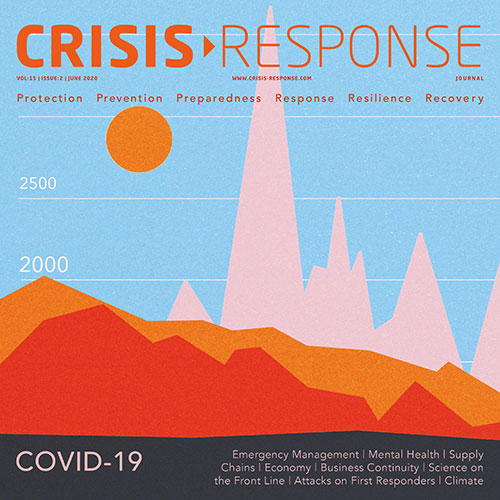
Our cover, pictured right, is an interpretation of some of the tragic death trajectories caused by the coronavirus, and its impact on the world.
And below, you will find summaries of what lies inside, including a multidisciplinary analysis of Covid-19 and its many layered impacts. These include mental health, supply chains, equality, science, business, trust and recovery.
But we all know that other crises and impending disasters don't magically dissipate just because of a virus, so we also look at attacks on EMS workers, the threat of right-wing lone actors, climate, online learning, technology, AI and communications.
If you don't already subscribe, check out our 20% discount - just use the code TOGETHER20 at checkout, and we look foward to welcoming you to our community!
Comment
Time to stand up and be heard: Eric J Russell asks why warnings and advice from disaster managers and experts go unheeded with such depressing regularity
Disaster management and Godzilla: Shin Godzilla is the metaphorical embodiment of contemporary and institutional disaster management in a large-scale catastrophe, say Troy Bouffard, Sean McGee and Cameron D Carlson from the University of Alaska Fairbanks, USA
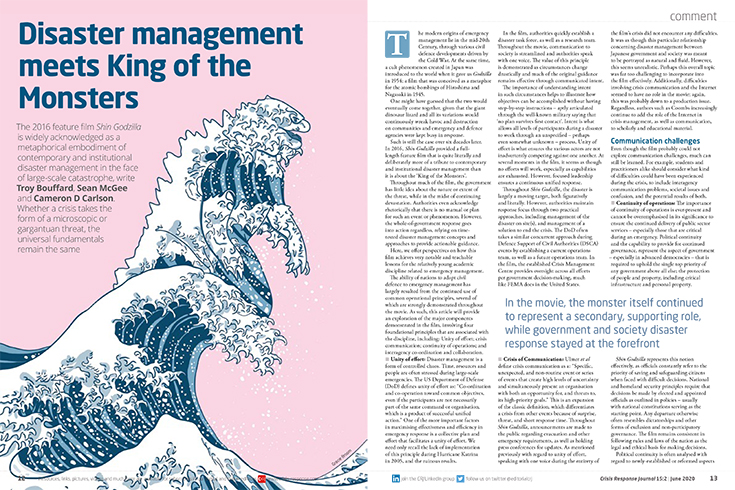
Climate change in the time of Covid-19: Alice C Hill and William Kakenmaster warn that although the current pandemic has seen the largest annual decrease in carbon emissions in recorded history, we cannot divert focus from the crucial efforts needed to reduce emissions permanently. We must prepare for – and adapt to – the effects of climate change
Covid-19 analysis
Emergency management: The pandemic is a make-or-break test of crisis response preparation and is likely to be the first of many global crises. We shouldn’t just be dealing with this one, but preparing for the next, says John Drake
Why have an independent inquiry? Lucian J Hudson presents the case for a timely, independent lessons learned inquiry in the UK, calling for a new social contract that requires national threats to be reviewed regularly and visibly. Above all, he says, the usual cry, ‘Never again’, cannot be left in a vacuum. Government, business, civil society, universities and the media need to forge a new social contract that requires national threats to be reviewed regularly and visibly, the public is kept informed about risks and how to respond, and contingency planning is robust and given a higher order of priority in government and in board rooms.

Is there really a ‘new normal’? Citizens in Western Europe, North America and beyond have never had restrictions on our freedom such as those mandated by the response to Covid-19, writes Lyndon Bird. What does this bode for the future?
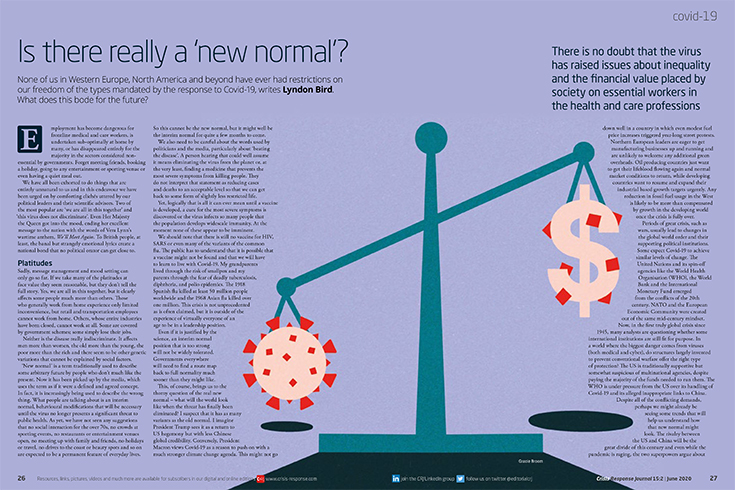
No one is coming: Emergency managers will still be working in communities to pick up the pieces long after the Covid-19 crisis is over. Sherry-Lea Bloodworth Botop says this is nothing new and that the recovery process often lacks the necessary support
Supply chain surge capacity: Covid-19 saw the entire world simultaneously in need of the same lifesaving tools. Bill Peterson explores how globalisation, interconnectedness and the constant quest to drive prices down in the public and private sectors have led to a battle between national and international interests
Lockdown exits and supply chains: The only effective way to avoid logistical disruption is to slow the recovery of economic activity with a gradual ending of lockdowns, as Gilles Paché explains
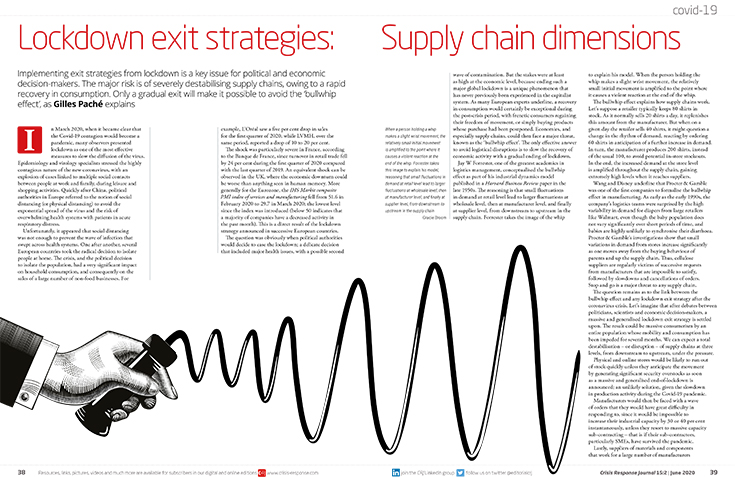
Science on the front line: The current pandemic has laid bare the need for independent, well-funded science and research and it is vital that governments do not interfere, but instead provide support, says Paolo Garonna
Building equity in crises: Covid-19 disproportionately affects people of colour and those living with poverty and medical fragility. Marcus Tillman Coleman Jr calls for change, and outlines how to achieve this
The psychosocial burdens of Covid-19: Virtually everyone across the globe will experience varying degrees of psychosocial burden as a result of this crisis, write Gregory Ciottone, MD, Todd Benham, PsyD, Michelangelo Bortolini, MD, and Major Michael Court
Overcoming mental health challenges: There are many effects of the pandemic that are deleterious to our wellbeing. What can we do to keep ourselves healthy, both physically and mentally? Lyzi G Cota provides some answers
Drawing from hostage experiences: Sue Williams advises on how to cope with isolation, whether in lockdown or a prolonged hostage situation, using ‘conduct after capture’ techniques
Harnessing Artificial intelligence in healthcare environments: Artificial intelligence told us about the pandemic before the WHO knew about it, writes Stephane Martin. Here, he explores the use of chatbots in healthcare, disease prediction and modelling, citizen data and sentiment analysis on social media as trends to watch in future outbreaks and in the healthcare sector
Transformational technology: Susan Morgan asks us to question the long-term implications of deploying digital technology as a response to Covid-19. She discusses digital contact tracing apps and immunity passports, warning that: “We would be right to be wary of repeating the mistakes of a decade ago by being too optimistic about the ability of technology to help lead us to a brighter place.” She also highlights how governments and companies have a poor track record in deserving trust when it comes to data
Infecting the truth: At a time when trust between government and the population is vital, Covid-19 presents a chance for disinformation and conspiracy theories to abound, reports Ørjan Karlsson. With the vaccine still on the horizon, there is ample time for the merry-go-round of Covid-19 related disinformation, conspiracy theories and fake news to spin for quite a few more turns
Communication and recovery: Exercises and training focus on responding to a crisis quickly, but they rarely consider how to deal with the situation that follows, writes Amanda Coleman
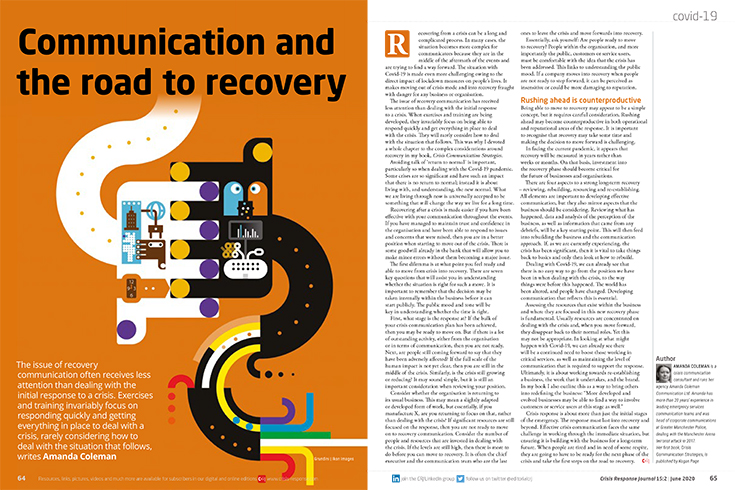
A humanitarian perspective: Andrew B Brown looks at how a faith-based INGO has kept its staff safe while helping to protect vulnerable communities
Healthcare
Delivering care in complex disasters: Planning a medical response must go beyond the immediate to address the long-term health care needs of affected communities, says Dr Ayman S Jundi
Shifting the balance in medicine: Margaret Heffernan used to object to the idea of telemedicine because she thought it was less human and a denial of comfort in times of need. But, she says, she has changed her mind
EMS workers in hostile environments: Emergency Medical Service workers are exposed to aggression and violence in their daily operations, but they are not always prepared. A change in mindset is required, contends Christoph Lippay
Violence & extremism
Can we prepare for school shootings? Attacks on students continue to happen sporadically throughout the world. Kjell Brataas takes a closer look at lessons learned
Tackling right-wing lone actors: We must hold a mature debate on home-grown terrorism and its causes, but society, governments and industry are turning a blind eye, says Florian Hartleb
Response
Superyachts in island disaster response: There is significant potential for superyachts to have an impact in island-based responses, say Grant Dawson and Michael Court
Online learning in lockdown: Anne Garçon contends that the need for local humanitarian action is greater than ever and the demand for easily accessible online learning is growing as people adjust to new ways of life
The future of emergency services is now: Next Generation 112 incorporates new technologies to revolutionise the work of emergency services, reports Beatriz Peon
The critical communications agenda: Mladen Vratonjic describes the work of the Critical Communications Association, which works to advance the quality of wireless communications
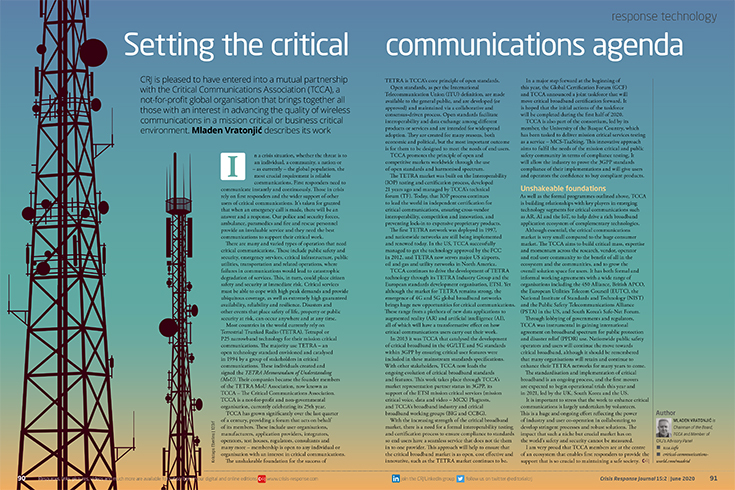
Drones and humanitarian missions: Drones can enhance the safety of citizens and responders and increase operational effectiveness. They are an essential part of the public safety response toolbox, according to Charles Werner
The drone threat landscape: Drones can bring innumerable benefits, but this could come at a price. Andrew Staniforth looks at the development of rules and systems to govern their use
Regulars
Events: A full round-up of scheduled, rescheduled and virtual events, along with announcements of a CRJ partnership, free webinars from CRJ Key Network Partner Pix4D and webinars from Ricardo
Frontline: Claire Sanders speaks to Chris Sheldrick, CEO and Founder of what3words, to find out how businesses and emergency services make use of its technology